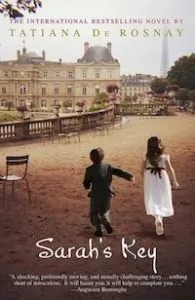
Why I’m Not Reading About WWII Anymore
This content contains affiliate links. When you buy through these links, we may earn an affiliate commission.
I love reading historical fiction; I always have. Growing up, I was fed a healthy diet of Little House on the Prairie, the Dear America Series, and award-winning historical fiction. I read a lot of books that required you to suspend your disbelief, so that the humble protagonist could interact with history’s famous figures. As an adult, I still read plenty of historical fiction, but I am more selective now. I enjoy the process of discovering nuances of a pocket of history and researching terms or events if I get curious about them.
Lately, when I skim the summaries of new historical fiction books that look interesting, something has stopped me from selecting those books to read. It’s the setting in which these books take place. Not a specific city or country, but World War II (WWII) as a setting. Over the last five to ten years, I have personally noticed a surge in publications of books set during WWII. I may be wrong about this. However, in my personal observation, it seems that finding new historical fiction books that are set in time periods other than that one is difficult.
 There is nothing inherently wrong with any one period in history. It isn’t just the overabundance of WWII fiction that makes me hesitant to continue reading it. The problem lies with the attitude of many about WWII. There were so many atrocities during WWII. Yet the treatment of WWII in American media is patriotic and romantic. Captain America, swing music, and the kissing couple in Times Square. Looking elsewhere, WWII has other imagery.
There is nothing inherently wrong with any one period in history. It isn’t just the overabundance of WWII fiction that makes me hesitant to continue reading it. The problem lies with the attitude of many about WWII. There were so many atrocities during WWII. Yet the treatment of WWII in American media is patriotic and romantic. Captain America, swing music, and the kissing couple in Times Square. Looking elsewhere, WWII has other imagery.
 Many books set during WWII focus on European Jews and victims of the Holocaust. These books are filled with gruesome, horrific imagery and heart wrenching stories, such as in Sarah’s Key. Fiction based on personal accounts have also been published, like The Tattooist of Auschwitz. It is imperative to continue to tell these stories, but maybe not in this way. Stories of suffering and gore for gore’s sake begin to blur. I think people feel good when they read books about (fictional) suffering, because it’s cathartic without actually hurting anyone.
The readers who continue to read WWII fiction for the suffering remind me a bit of the same people who continually want to know what’s going on in the mind of a serial killer. There is evil in the world that is unfathomable. We don’t need to rehash it over and over. Every side of the story of WWII seems to exist in novel form. I don’t want to read every side of the same story. I want to read new stories.
History is interesting. I love history. Knowing about the dark eras in history is vital for protecting the future. However, I think we must be cautious not to glamorize the past to make it marketable. I’ve decided that I no longer want to read about WWII.
Please note: these are my opinions. They do not reflect anyone else. I have chosen to stop reading historical fiction set during World War II, but I am not asking anyone else to do so. Everyone is entitled to making their own reading choices and forming their own opinions.
Looking for historical fiction recommendations?
50 of the Best Historical Fiction Books You Must Read
100 Must-Read YA Historical Novels
Many books set during WWII focus on European Jews and victims of the Holocaust. These books are filled with gruesome, horrific imagery and heart wrenching stories, such as in Sarah’s Key. Fiction based on personal accounts have also been published, like The Tattooist of Auschwitz. It is imperative to continue to tell these stories, but maybe not in this way. Stories of suffering and gore for gore’s sake begin to blur. I think people feel good when they read books about (fictional) suffering, because it’s cathartic without actually hurting anyone.
The readers who continue to read WWII fiction for the suffering remind me a bit of the same people who continually want to know what’s going on in the mind of a serial killer. There is evil in the world that is unfathomable. We don’t need to rehash it over and over. Every side of the story of WWII seems to exist in novel form. I don’t want to read every side of the same story. I want to read new stories.
History is interesting. I love history. Knowing about the dark eras in history is vital for protecting the future. However, I think we must be cautious not to glamorize the past to make it marketable. I’ve decided that I no longer want to read about WWII.
Please note: these are my opinions. They do not reflect anyone else. I have chosen to stop reading historical fiction set during World War II, but I am not asking anyone else to do so. Everyone is entitled to making their own reading choices and forming their own opinions.
Looking for historical fiction recommendations?
50 of the Best Historical Fiction Books You Must Read
100 Must-Read YA Historical Novels
 There is nothing inherently wrong with any one period in history. It isn’t just the overabundance of WWII fiction that makes me hesitant to continue reading it. The problem lies with the attitude of many about WWII. There were so many atrocities during WWII. Yet the treatment of WWII in American media is patriotic and romantic. Captain America, swing music, and the kissing couple in Times Square. Looking elsewhere, WWII has other imagery.
There is nothing inherently wrong with any one period in history. It isn’t just the overabundance of WWII fiction that makes me hesitant to continue reading it. The problem lies with the attitude of many about WWII. There were so many atrocities during WWII. Yet the treatment of WWII in American media is patriotic and romantic. Captain America, swing music, and the kissing couple in Times Square. Looking elsewhere, WWII has other imagery.
 Many books set during WWII focus on European Jews and victims of the Holocaust. These books are filled with gruesome, horrific imagery and heart wrenching stories, such as in Sarah’s Key. Fiction based on personal accounts have also been published, like The Tattooist of Auschwitz. It is imperative to continue to tell these stories, but maybe not in this way. Stories of suffering and gore for gore’s sake begin to blur. I think people feel good when they read books about (fictional) suffering, because it’s cathartic without actually hurting anyone.
The readers who continue to read WWII fiction for the suffering remind me a bit of the same people who continually want to know what’s going on in the mind of a serial killer. There is evil in the world that is unfathomable. We don’t need to rehash it over and over. Every side of the story of WWII seems to exist in novel form. I don’t want to read every side of the same story. I want to read new stories.
History is interesting. I love history. Knowing about the dark eras in history is vital for protecting the future. However, I think we must be cautious not to glamorize the past to make it marketable. I’ve decided that I no longer want to read about WWII.
Please note: these are my opinions. They do not reflect anyone else. I have chosen to stop reading historical fiction set during World War II, but I am not asking anyone else to do so. Everyone is entitled to making their own reading choices and forming their own opinions.
Looking for historical fiction recommendations?
50 of the Best Historical Fiction Books You Must Read
100 Must-Read YA Historical Novels
Many books set during WWII focus on European Jews and victims of the Holocaust. These books are filled with gruesome, horrific imagery and heart wrenching stories, such as in Sarah’s Key. Fiction based on personal accounts have also been published, like The Tattooist of Auschwitz. It is imperative to continue to tell these stories, but maybe not in this way. Stories of suffering and gore for gore’s sake begin to blur. I think people feel good when they read books about (fictional) suffering, because it’s cathartic without actually hurting anyone.
The readers who continue to read WWII fiction for the suffering remind me a bit of the same people who continually want to know what’s going on in the mind of a serial killer. There is evil in the world that is unfathomable. We don’t need to rehash it over and over. Every side of the story of WWII seems to exist in novel form. I don’t want to read every side of the same story. I want to read new stories.
History is interesting. I love history. Knowing about the dark eras in history is vital for protecting the future. However, I think we must be cautious not to glamorize the past to make it marketable. I’ve decided that I no longer want to read about WWII.
Please note: these are my opinions. They do not reflect anyone else. I have chosen to stop reading historical fiction set during World War II, but I am not asking anyone else to do so. Everyone is entitled to making their own reading choices and forming their own opinions.
Looking for historical fiction recommendations?
50 of the Best Historical Fiction Books You Must Read
100 Must-Read YA Historical Novels











